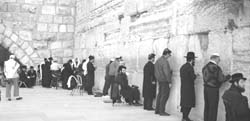“The peace process has been going
on since 1993, and the men involved are bound by the agreements that have
been made and the steps that have been taken in negotiations. You can’t
just derail the process. It’s a matter of who is willing to negotiate
for what — who gets what and who gives what.”
Manochehr Dorraj
Professor of Political Science
|
Peace in the Middle East? Story Jaime Walker Editor’s Note: This week’s issues page focuses on the struggle for peace in the Middle East and the upcoming Israeli prime ministerial election. When Israeli Prime Minister Ehud Barak resigned following a vote of no confidence from Israeli Parliament, he forced Tuesday’s early election.
According to the British Broadcasting Company, his decision offers Israeli citizens a chance to either renew their faith in him or select his opponent Ariel Sharon, the head of the main right-wing party, the Likud. Barak, the leader of Israel’s Labour Party, was originally elected as prime minister in 1999 on the platform he would bring peace to the region, but violent conflict between the Palestinians and the Israelis has continued to escalate. Manochehr Dorraj, professor of political science, said Barak called the early election in hopes that he would regain the support of the Israeli people. But current public opinion points to a resounding defeat. “The people who elected Barak hoped he was strong enough to make the concessions that might bring peace to the region,” Dorraj said. “But he has been unable to reach an agreement of any kind. The Israeli people have begun to question his legitimacy as a leader, and he may not be able to recover those votes.” Polls indicate Barak’s challenger, Sharon, has a commanding lead in the race, with the Jerusalem Post reporting “nothing short of a miracle will ensure a Barak victory.” Barak’s inability to reach a peace agreement with the Palestinians is one of the major catalysts for the early election, and for that reason the peace process is dominating the election, Dorraj said. The BBC reports that Arab leaders throughout the region are concerned that a Sharon victory could move Israel to the brink of war. His hawkish stance on peace in the Middle East has raised red flags, particularly in Lebanon, where he led Israel’s invasion of the country in 1982. Sharon, whose recent visits to Jerusalem’s holy sites sparked a cycle of violence in the region, said if he is elected he will reverse most of the concessions Barak has made to the Palestinians. Israeli society is no stranger to deeply-rooted, derisive political battles. In a country riveted by political strife, politics are weighed with religious overtones and fraught with conflicts over territory and water. The conflict goes back to 1948 when the United Nations proclaimed Israel a state. According to the BBC, the political move displaced more than 3.7 million Palestinians. For the two sides the conflict is about land. Israel captured East Jerusalem in 1967. Although the Israeli government has proposed giving municipal powers to the approximately 310,000 Palestinians who live in the region, Palestinians want total control. It’s about policy. Palestinian leader Yasser Arafat wants Israel to return the territories it seized in 1967, which include the West Bank and the Gaza Strip. Israel says there is no chance the nation will return to its pre-1967 boarders. It’s about religion. Israel wants to annex portions of the West Bank for Jewish settlements. Arafat wants the communities to be dismantled. It’s about fresh water. Both groups rely on the water aquifers that run through the West Bank. Palestinians want more access. Israelis say the area cannot give up the land. Dorraj said the election is of global importance because the overall political stability of the region could be dependent upon who wins the election. “The world will be watching,” he said. “Who ever is elected may hold the key not only to the continuation of a peace agreement, but also to whether or not, in a worst-case scenario, there would be a further polarization of the various parties.” |
The TCU Daily Skiff © 1998, 1999, 2000, 2001
Web Editor: Ben Smithson
Contact Us!

